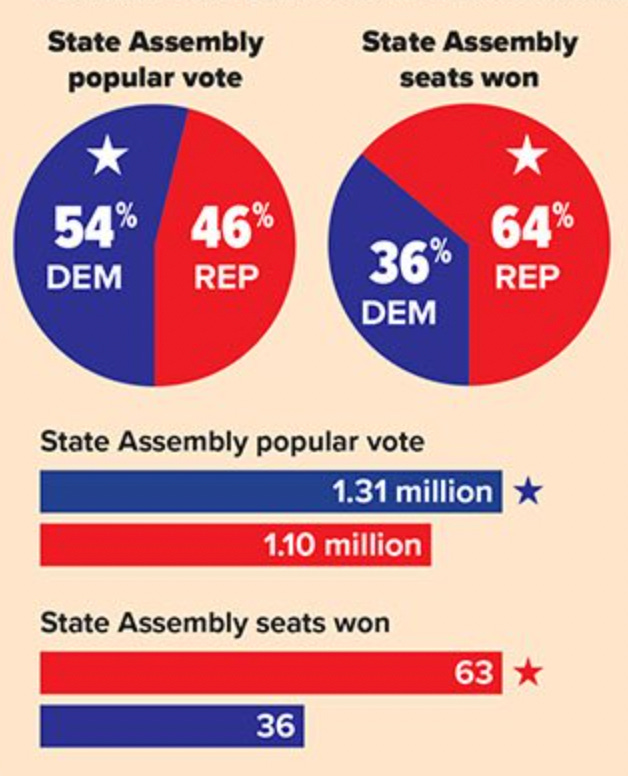Wisconsin Republicans' nuclear option

In April, Janet Protasiewicz was elected to the Wisconsin Supreme Court with more than one million votes, defeating her conservative opponent by a wide margin. Her victory tipped the balance of the court, and the new liberal majority will soon review a case, Clarke v. Wisconsin Elections Commission, that could overturn the state’s heavily gerrymandered, Republican-drawn legislative maps.
Protasiewicz was sworn in on August 1. But now, before Protasiewicz has had an opportunity to rule on a single case, Wisconsin Republicans are threatening to impeach her.
At issue are Protasiewicz's comments during her successful campaign, in which she described the maps as “rigged,” saying that they “do not reflect people in this state.” Those comments have already been subject to a number of complaints by the Republican Party of Wisconsin and others to the Wisconsin Judicial Commission, alleging Protasiewicz violated the judicial code of ethics. In May, the Commission dismissed those complaints, finding that Protasiewicz's comments during the campaign did not violate ethics rules.
Republicans also object to campaign contributions that Protasiewicz received from the Democratic Party. Assembly Speaker Robin Vos (R), who was one of the first to float the idea of impeachment, says that the $10 million contribution from the Democratic Party confirms that “Protasiewicz and the Democratic Party 'are one and the same.'"
Republicans in the legislature have vowed to remove Protasiewicz from office unless she recuses herself from gerrymandering cases. If Protasiewicz were to recuse, the court would likely stalemate on the issue, locking in the existing maps. Protasiewicz could be impeached by a simple majority of the Wisconsin Assembly, a body where Republicans dominate. Conviction and removal in the Wisconsin Senate would require a two-thirds majority — but Republicans control exactly 22 of the body's 33 seats. Even if Protasiewicz was ultimately not convicted by the Wisconsin Senate, she would have to recuse herself from cases until the trial was completed.
Republicans and conservative members of the court used to have a much different view on recusal. In 2007, Wisconsin Manufacturers & Commerce (WMC), the state’s largest business lobbying group, spent an “estimated $2.2 million” to help elect (now-Chief) Justice Annette Ziegler. That year, Ziegler sat alongside her colleagues on “a high-profile sales tax case” involving the WMC and refused to step down despite facing criticism. The court ruled 4-3 “in favor of WMC’s position,” and Ziegler wrote the majority decision. No Republicans called for Ziegler's impeachment.
Ziegler did this again in 2009: she refused to recuse herself from a case with broad implications for WMC. This time, she was joined by former Wisconsin Supreme Court Justice Michael Gableman, who declined to step down from the case despite receiving $1.8 million from WMC.
That same year, WMC proposed a rule to ensure the members of the court it helped elect could still hear its cases. WMC proposed that judges would "not be required to step aside from cases involving groups or individuals no matter how much they spent to help their campaigns.” The rule was narrowly approved by a vote of 4-3 of the court. Ziegler and Gableman voted in favor.
In 2017, a group of 54 retired Wisconsin judges petitioned the court to “adopt a rule requiring judges and justices to recuse from matters involving individuals and entities who financially supported their campaigns.” But the state’s conservative majority, which included Ziegler and another justice, Rebecca Bradley, shot the proposal down. Bradley criticized the petition for “its disregard for the Wisconsin Constitution and the United States Constitution, particularly the First Amendment.”
And yet, on August 15, Bradley publicly criticized Protasiewicz for failing to recuse herself from the gerrymandering case because she accepted money from the Democratic Party:
Despite receiving nearly $10 million from the Democrat Party of Wisconsin and declaring the maps "rigged," Protasiewicz has not recused herself from the case. These four justices will adopt new maps to shift power away from Republicans and bestow an electoral advantage for Democrat candidates, fulfilling one of Protasiewicz's many promises to the principal funder of her campaign.
Bradley did not mention that she received $70,000 from the Wisconsin Republican Party — a group that benefits from the existing maps — in support of her campaign. Another conservative justice, Brian Hagedorn, received $150,000. Vos and other Republicans are not demanding Bradley and Hagedorn recuse themselves from the gerrymandering case. And they are not threatening to impeach the pair if they fail to recuse.
Why Wisconsin Republicans are so desperate to keep their gerrymandered maps
Gerrymandering is not unique to Wisconsin. But, for more than a decade, Wisconsin Republicans have gerrymandered the state's legislative maps so aggressively that it is effectively impossible for Democrats to gain control of the state legislature.
In 2018, for example, Democrats swept statewide contests for Governor, Attorney General, U.S. Senate, State Treasurer and Secretary of State. That year, 54% of Wisconsin voters selected a Democrat to represent them in the state assembly, with Democratic candidates collecting 200,000 more votes than Republican candidates. And yet, Republicans won 63 of 99 seats in the state assembly — nearly a two-thirds majority.
In 2022, it was a similar story. The statewide electorate was closely divided, with incumbent Governor Tony Evers (D) and incumbent U.S. Senator Ron Johnson (R) both narrowly winning reelection. But Republicans won 64 seats in the state assembly and 22 of 33 state senate seats.
How did Republicans create a map that could produce such lopsided results? First, they engaged in traditional gerrymandering practices like "cracking" and "packing." In some cases, blocks of Democratic voters are "cracked" into many different pieces to dilute their voting power. For example, Milwaukee County, a Democratic stronghold, is split among 21 different legislative districts. When "cracking" isn't feasible, Democratic voters are "packed" into districts with as few Republicans as possible so Republican voters can be used to gain control of other districts.
But the maps created by Wisconsin Republicans go even further to reduce Democratic voting power. Take, for example, District 47, a Madison-area district that is not only oddly shaped but contains "a host of disconnected pieces scattered across Dane County." Some residents of District 47, "must cross two other assembly districts before reaching another part of their district." In the map below, all areas shaded in yellow are part of District 47:
According to the lawsuit filed challenging the state senate and assembly maps, this is not an anomaly. Across the state, "A remarkable 55 assembly districts, consisting of between 2 and 40 disconnected pieces of territory, and 21 senate districts, consisting of between 2 and 34 disconnected pieces of territory, are noncontiguous."
While Republicans are claiming Protasiewicz is unacceptably partisan, only a Wisconsin Supreme Court Justice completely blinded by partisanship would uphold non-contiguous districts as legal. The Wisconsin Constitution requires that assembly districts "assembly districts shall be 'bounded by county, precinct, town or ward lines, to consist of contiguous territory and be in as compact form as practicable' and that senate districts must be composed of whole assembly districts and must consist of 'contiguous territory.'" As it stands, a "majority of the current legislative districts… violate these constitutional commands."




Wisconsin Republicans think they are invincible and will likely go ahead and impeach. The smart play for her would then be to immediately resign, allowing Gov. Evers to appoint her replacement. Out of pure spite he should appoint someone even more liberal. The gerrymandering and abortion cases should then be fast tracked and decided quickly.
And then in 2024 Democrats should ride a wave of rage to power in all statewide offices, and using fair maps, majorities in the legislature. Judge Janet should also run for her stolen seat on the court, unless there are rules against it given impeachment.
Wow, Judd and Tesnim, thank you for all of this information--this has been all over the news but I'm guessing that very few understand anything about what can be done about it. Unfortunately, everything in the law can take "forever" (while the Republican party implements their agenda in every corner). Peter, commenting 34 minutes ago, seems to have one solution, maybe the best one, but I can't imagine Protasiewicz being willing to risk the move of resigning. And, how long would it take for the Governor to install a more liberal judge?
I just looked up the legal qualifications of one of my favorite Senators from the past, Russ Feingold, who was defeated by Ron Johnson in 2010 by Koch money. He'd be the perfect replacement Judge:
"For the better part of the last 10 years and in addition to his congressional and diplomatic career, Russ has taught extensively at various American law schools including Stanford Law School (where he is currently teaching), Yale Law School, Marquette University Law School, and Harvard Law School."